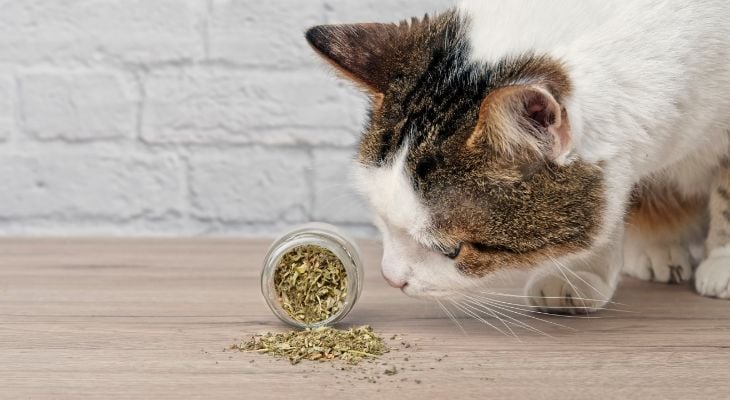
Few things stimulate a cat's pleasure faster than catnip. Exposure to this simple herb can reveal a new side to their feline personality. Many cats will go crazy at the smell of this plant.
Catnip has a reputation of being a feline drug and many cat owners wonder if it is safe to give it to their pet. Giving catnip in small doses does no harm. Using it as a treat can be quite good for your cat's emotional health. It relieves stress and can help them get rid of nervous energy.
What Is Catnip?
Catnip is a type of mint plant found in many countries throughout the world. It can grow up to three feet high and has many branches filled with purple flowers and heart shaped leaves.
The catnip plant has an aromatic oil called nepetalactone. When cats smell this compound, it triggers the part of the feline brain that responds to happy pheromones. This is why cats react the way they do.
Many cats seem to go crazy when they smell catnip by rolling, rubbing and running around. Eating catnip seems to produce the opposite effect. Cats often become mellow when they ingest the plant. This response to catnip usually lasts up to 10 minutes before the cat loses interest.
Catnip as a Training Tool
Creative cat owners can use catnip as a reward or incentive to promote good behavior in their felines. Rubbing dried catnip on a scratching post or cat tree can entice your cat to go there when they need to sharpen their claws instead of tearing your couch to shreds.
Lacing a cat toy with some catnip can be beneficial for inducing an indoor cat to exercise. It will encourage them to be more active and play and prevent obesity. These cat toys should be stored in an airtight container when not in use, so the catnip stays fresh longer.
Growing Catnip
You can grow your own catnip plants in a home garden. You can buy more mature plants from a nursery or plant the seeds after the last major frost of the season. It is important to put the plant in an area where it has plenty of room to grow. Take steps to protect the growing plant from your cat so they don't tear it out of the soil before it is fully mature.
Sources:
"Catnip Confidential," Veterinary Practice News. February 1, 2012.
